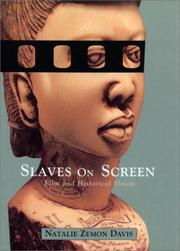| Listing 1 - 10 of 12 | << page >> |
Sort by
|

ISBN: 0674004442 Year: 2000 Publisher: Cambridge (Mass.) : Harvard university press,
Abstract | Keywords | Export | Availability | Bookmark
 Loading...
Loading...Choose an application
- Reference Manager
- EndNote
- RefWorks (Direct export to RefWorks)
Sociology of minorities --- Film --- Slavery in motion pictures.
Book
ISBN: 2915596581 9782915596588 Year: 2011 Publisher: Bécherel: Les Perséides,
Abstract | Keywords | Export | Availability | Bookmark
 Loading...
Loading...Choose an application
- Reference Manager
- EndNote
- RefWorks (Direct export to RefWorks)
French literature --- Slavery in literature --- Slavery in motion pictures --- Slave-trade
Book
ISBN: 9782729709082 Year: 2016 Publisher: Lyon : Presses universitaires de Lyon,
Abstract | Keywords | Export | Availability | Bookmark
 Loading...
Loading...Choose an application
- Reference Manager
- EndNote
- RefWorks (Direct export to RefWorks)
Slavery in motion pictures. --- Collective memory and motion pictures. --- Ethnographic films --- Slavery --- History and criticism. --- Historiography.
Book
ISBN: 1316530477 1316532151 1107270049 Year: 2016 Publisher: New York, NY : Cambridge University Press,
Abstract | Keywords | Export | Availability | Bookmark
 Loading...
Loading...Choose an application
- Reference Manager
- EndNote
- RefWorks (Direct export to RefWorks)
The Cambridge Companion to Slavery in American Literature brings together leading scholars to examine the significance of slavery in American literature from the eighteenth century to the present day. In addition to stressing how central slavery has been to the study of American culture, this Companion provides students with a broad introduction to an impressive range of authors including Olaudah Equiano, Frederick Douglass, Harriet Beecher Stowe and Toni Morrison. Accessible to students and academics alike, this Companion surveys the critical landscape of a major field and lays the foundations for future studies.
Slavery in literature. --- American literature --- History and criticism. --- Slavery in motion pictures. --- African American authors
Book
ISBN: 9782753586840 2753586845 Year: 2022 Publisher: Rennes Presses universitaires de Rennes
Abstract | Keywords | Export | Availability | Bookmark
 Loading...
Loading...Choose an application
- Reference Manager
- EndNote
- RefWorks (Direct export to RefWorks)
Cet ouvrage aborde les discours et les images qui représentent la traite esclavagiste, du XVIe au XXIe siècle, et sur les trois continents concernés : l'Afrique, l'Europe, l'Amérique ; il analyse notamment la façon dont écrivains et artistes se sont emparés des mémoires, des imaginaires et des traumatismes de l'esclavage pour réécrire l'Histoire. Des peintures de Jacob Lawrence aux romans d'Ayi Kwei Armah, des films sur le passage du milieu aux bandes dessinées, des romans historiques de Kangni Alem au témoignage de Lewis Cudjo, les œuvres étudiées soulignent les traces de l'esclavage sur le présent. À l'instar des artistes et des écrivains, les musées qui revisitent ce passé à travers de nouvelles mises en scène expriment le besoin de décoloniser les mémoires de l'esclavage en reconstruisant la subjectivité de l'esclavisé. Cet ouvrage participe à cet effort collectif en portant l'attention du lecteur sur les nouveaux récits de l'esclavage
Slave trade in art --- Slavery in literature --- Slave trade in literature --- Slavery in motion pictures --- Slavery in art --- Collective memory
Book
ISBN: 9781496833105 1496833104 9781496833112 1496833112 Year: 2021 Publisher: Jackson University Press of Mississippi
Abstract | Keywords | Export | Availability | Bookmark
 Loading...
Loading...Choose an application
- Reference Manager
- EndNote
- RefWorks (Direct export to RefWorks)
"In Slave Revolt on Screen: The Haitian Revolution in Film and Video Games author Alyssa Goldstein Sepinwall analyzes how films and video games from around the world have depicted slave revolt, focusing on the Haitian Revolution (1791-1804). This event, the first successful revolution by enslaved people in modern history, sent shock waves throughout the Atlantic World. Regardless of its historical significance however, this revolution has become less well-known-and appears less often on screen-than most other revolutions; its story, involving enslaved Africans liberating themselves through violence, does not match the suffering-slaves-waiting-for-a-white-hero genre that pervades Hollywood treatments of Black history. Despite Hollywood's near-silence on this event, some films on the Revolution do exist-from directors in Haiti, the US, France, and elsewhere. Slave Revolt on Screen offers the first-ever comprehensive analysis of Haitian Revolution cinema, including completed films and planned projects that were never made. In addition to studying cinema, this book also breaks ground in examining video games, a pop-culture form long neglected by historians. Sepinwall scrutinizes video game depictions of Haitian slave revolt that appear in games like the Assassin's Creed series that have reached millions more players than comparable films. In analyzing films and games on the revolution, Slave Revolt on Screen calls attention to the ways that economic legacies of slavery and colonialism warp pop-culture portrayals of the past and leave audiences with distorted understandings"--
Revolutions in motion pictures --- Blacks in motion pictures --- Video games --- Motion pictures --- Slavery in motion pictures --- History --- Haiti --- History.
Book
ISBN: 9783515110891 3515110895 Year: 2016 Volume: 40 Publisher: Wiesbaden Franz Steiner Verlag
Abstract | Keywords | Export | Availability | Bookmark
 Loading...
Loading...Choose an application
- Reference Manager
- EndNote
- RefWorks (Direct export to RefWorks)
Slavery in literature --- Slavery in motion pictures --- Slavery --- Esclavage dans la littérature --- Esclavage au cinéma --- Esclavage --- Congresses. --- Congresses --- Congrès --- Esclavage dans la littérature --- Esclavage au cinéma --- Congrès

ISBN: 0814339905 9780814339909 0814330991 9780814330999 Year: 2008 Publisher: Detroit : Wayne State University Press,
Abstract | Keywords | Export | Availability | Bookmark
 Loading...
Loading...Choose an application
- Reference Manager
- EndNote
- RefWorks (Direct export to RefWorks)
Book
ISBN: 0295746653 9780295746654 9780295746647 9780295746630 0295746645 0295746637 Year: 2020 Publisher: Seattle, Washington : University of Washington Press,
Abstract | Keywords | Export | Availability | Bookmark
 Loading...
Loading...Choose an application
- Reference Manager
- EndNote
- RefWorks (Direct export to RefWorks)
"Slavery and the Post-Black Imagination brings the provocative category of post-blackness to bear on the past 30 years of artistic exploration into the afterlife of slavery as it continues to manifest in the United States. The selected essays cut across a broad spectrum of artistic media and genres -- including prose fiction, the graphic novel, verse, drama, film, TV, and music -- to capture the ubiquity and vibrancy of the post-black imagination in contemporary African American culture. They interrogate political, as well as formal, interventions into established discourses of slavery and black identities, to demonstrate how interrogations of black identities frequently goes hand in hand with the purposeful refiguration of slavery's prevailing tropes, narratives, and images. Taken altogether, this collection positions "post-blackness" as a valid and productive category of analysis that brings recent developments in African American cultural productions across variousmedia into sharp focus"--
Slavery in mass media. --- Esclavage dans la litterature. --- American literature --- Slavery in literature. --- History and criticism. --- African American authors --- African Americans --- Race in literature. --- Race in motion pictures. --- Slavery in motion pictures. --- Social conditions.

ISBN: 9780822341277 9780822341512 0822341514 0822341271 0822388839 Year: 2008 Publisher: Durham ; London Duke University Press
Abstract | Keywords | Export | Availability | Bookmark
 Loading...
Loading...Choose an application
- Reference Manager
- EndNote
- RefWorks (Direct export to RefWorks)
The French slave trade forced more than one million Africans across the Atlantic to the islands of the Caribbean. It enabled France to establish Saint-Domingue, the single richest colony on earth, and it connected France, Africa, and the Caribbean permanently. Yet the impact of the slave trade on the cultures of France and its colonies has received surprisingly little attention. Until recently, France had not publicly acknowledged its history as a major slave-trading power. The distinguished scholar Christopher L. Miller proposes a thorough assessment of the French slave trade and its cultural ramifications, in a broad, circum-Atlantic inquiry. This magisterial work is the first comprehensive examination of the French Atlantic slave trade and its consequences as represented in the history, literature, and film of France and its former colonies in Africa and the Caribbean. Miller offers a historical introduction to the cultural and economic dynamics of the French slave trade, and he shows how Enlightenment thinkers such as Montesquieu and Voltaire mused about the enslavement of Africans, while Rousseau ignored it. He follows the twists and turns of attitude regarding the slave trade through the works of late-eighteenth- and early-nineteenth-century French writers, including Olympe de Gouges, Madame de Staël, Madame de Duras, Prosper Mérimée, and Eugène Sue. For these authors, the slave trade was variously an object of sentiment, a moral conundrum, or an entertaining high-seas “adventure.” Turning to twentieth-century literature and film, Miller describes how artists from Africa and the Caribbean—including the writers Aimé Césaire, Maryse Condé, and Edouard Glissant, and the filmmakers Ousmane Sembene, Guy Deslauriers, and Roger Gnoan M’Bala—have confronted the aftermath of France’s slave trade, attempting to bridge the gaps between silence and disclosure, forgetfulness and memory.
French literature --- Slavery in literature. --- Slavery in motion pictures. --- Slave trade --- Littérature française --- Esclavage dans la littérature --- Esclavage au cinéma --- Esclaves --- History and criticism. --- Histoire et critique --- Commerce --- Slave-trade --- Motion pictures --- Slavery and slaves in literature --- Slaves in literature --- Littérature française --- Esclavage dans la littérature --- Esclavage au cinéma --- Slavery in literature --- Slavery in motion pictures --- History and criticism --- Enslaved persons in literature --- Esclavage --- Traite des esclaves --- Thèmes, motifs --- Dans la littérature --- France --- Au cinéma
| Listing 1 - 10 of 12 | << page >> |
Sort by
|

 Search
Search Feedback
Feedback About UniCat
About UniCat  Help
Help News
News